Borrego Desert Gardeners
Join us
on Facebook
If you enjoy
gardening in the desert, or if you think you might, then the Desert Gardeners
will be just the place to meet others who share your passion, to learn from
each other, and to share what you know. Everyone interested in gardening is
invited to this fun, free, and casual group.
The Gardeners Club meets
monthly on the second Friday at 10 a.m. through March. Please visit
ABDNHA's Activity Calendar and our
Borrego Gardeners Facebook Page for up-to-date information about our
upcoming meetings.
This desire for the gardeners club grew out of a small group last year who worked together to
care for ABDNHA’s Borrego Botanical Garden. We worked weekly on our own
schedules to keep the garden tidy—trimming, weeding, raking, picking up, and
occasionally gathering for a casual potluck lunch in the garden.
The Desert
Gardeners is a wider group gathering, where we bring our own folding chairs
and share information and experiences on topics of interest to the group—such
as fall plantings, vegetable gardening, soil, irrigation, composting, native
plants in the garden, and even garden art and creative garden projects.
Sometimes we visit gardens and meet there.
If you enjoy gardening in the desert, or if you think you might, then ABDNHA's
new group of Borrego Desert Gardeners will be just the place to meet others
who share your passion, to learn from each other, and to share what you know.
Enter your name and email address below and we will be put you on our email
list:
 |
|
Fall Vegetable Gardening
Late Spring Gardening
Flowers of the Desert Garden
Desert Living LATE SPRING GARDENING
By Joan Putney and Betsy Knaak
The Borrego Springs low desert has two distinct gardening seasons, the fall when
many winter vegetables can be planted, and the hot summer season beginning in
late March and into April, when melons, basil, squash, zinnias, marigolds,
cactus, and new citrus trees can be planted.
APRIL
• Citrus: New citrus trees can be planted this month, and established trees
should be fertilized.
• Landscape trees, shrubs, cacti and succulents can still go in, early in the
month, so that roots get established before summer.
|
• Seeds or transplants of cantaloupe, jicama, lima beans,
okra, basil and oregano can be set out in the warm-season garden.
• Taken
from Old Wives’ Lore for Gardeners: On marigolds, “Both the aroma and the
excretions from the roots are invaluable, whether in flower or vegetable
garden or in the greenhouse.” Two packets of seeds are currently in
the sprout stage amongst my vegetables!
• Around town in landscape: Desert gardens bloom this month with lush roses,
sunny palo verde trees, and brilliant cactus blossoms. Watch for the deep
purple-blue of the indigo bush.
Photo of Indigo Bush, Betsy’s Garden.
|
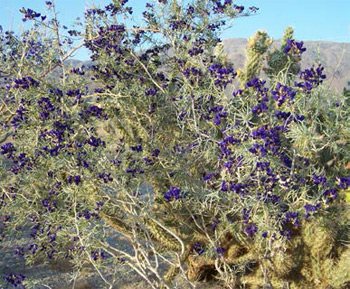 |
MAY
• Time to mulch. A two- or three-inch layer will conserve water, keep roots
cooler during summer, deter weeds, and looks good, too. Use compost, chopped
bark, pebbles, gravel, even straw. Remember to keep mulch away from stems and
trunk, however. Don’t forget to mulch tomato plants.
• Now is the time to adjust irrigation in preparation for the warmer months
ahead.
• If you have established palm trees, feed them this month.
• Start an Ocotillo by simply cutting off a branch and planting. Water until you
are sure it is a living plant and taper off gradually. Water recently
transplanted Ocotillos weekly until established.
|
• Let some of your cool season flowers and vegetable go to
seed. Collect by tapping the heads inside a paper bag. A
favorite is Fennel. Use the seeds for planting and for
seasoning potato or slaw salads.
• Around town in landscape: Look for the lovely blue-gray
blooms of Smoke Trees and the orchid-like blossoms of
Desert Willow to be coming in along with the heat of early
summer.
Photo of Desert Willow, Betsy’s Garden. |
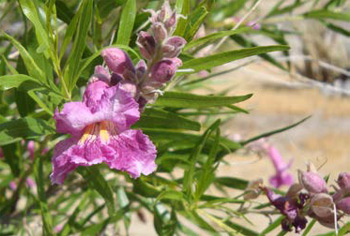 |
FALL VEGETABLE GARDENING IN THE DESERT
By Betsy Knaak
October is the prime month to begin thinking about planting a
vegetable garden in Borrego Springs. A vegetable garden makes sense,
especially during a time of ever-rising gasoline and food prices. It pays to
shop in your own garden!
If you had a garden last season, the soil has
rested over the summer period—irrigation to the vegetable garden has been
turned off, the soil enhanced, watered, and then covered with plastic to
sterilize under the desert’s hot summer sun.
Late August-September: Often the tendency is to plant too
early in our low desert (Zone 13) garden. We may experience a late hot spell
that destroys tender shoots of seeds planted too early. Rather than starting
seeds in the garden bed, use flats or used six-pac containers to start seeds.
Leave these outside, lightly covered, in the shade, and keep them moist. Soon
the seedlings will appear. By the time October comes, you will have a nice
selection of little vegetable plants to put into raised beds. Remember,
vegetables need six to eight hours of sunlight per day, so choose your
location carefully.
This is the time to plant herbs: chives, cilantro,
dill, fennel, parsley, sage, or lavender. Herbs can be started from seed in
small containers or flats. Now is also the time to plant beets, carrots,
turnips, and radishes. Be cautious with radishes. Plant a few seeds each week
as they grow rapidly. Plant these seeds in the main vegetable plot. (Don’t
start them in flats.) As soon as your flat seedlings are about four inches
tall and look vigorous, transplant them into the bed (Nov). |
|
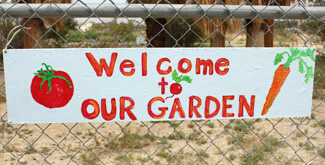 |
|
ABDNHA SCHOOL GARDEN
Borrego
Springs Middle School |
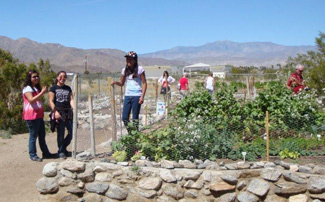 |
|
|
Swiss chard grows great! It’s delicious and many prefer it over spinach. It
is packed with nutrients, has gorgeous shiny leaves, which now come in many
colors, and it is a clean, insect-free plant. The leaves keep growing after each
cutting. Harvest the first leaves last December and still be picking into early
summer! We encourage you to try Swiss chard in your Borrego Springs or other low
desert garden! Arugula and kale are additional options for greens that grow
here.
|
|
In the ABDNHA Store
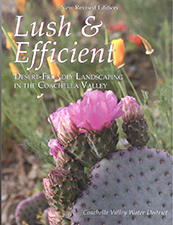
ABDNHA
Join Now! |
Bok choy is another excellent fall plant that is delicious in salads and
stir-fry dishes. It can be expensive and exotic in the grocery store, but is
an easy, fast grower in Borrego’s sandy soil. Left to flower, the yellow
blooms are attractive to pollinating bees and other beneficial insects.
Green onions can be started in flats or sown directly into the garden in
October or November. Be patient, they take time, but are well worth it. They
are a good “beginner” crop for new gardeners and are one of the more
rabbit-resistant food crops in the desert. Bulb onions do well also. We put in
sets in fall, just be patient; they take about five months. |
|
These vegetables can be attractive to insects: cabbage, cauliflower, and
broccoli to a lesser extent. We are not proponents of using insecticide in the
garden, so include only a few of these plants and see how you do. We’ve found
broccoli to be more resistant to insects here than cabbage. Even so, we’ve had
good luck with both red and green cabbage, several varieties of broccoli, and
cauliflower. We have started these both from seed in late summer or September,
and have also gone the way of purchasing starts if we didn’t get going with
seeds in time. The latest we have planted cabbage, cauliflower, or broccoli
starts here wasJanuary 4, with gave us harvests in mid-March. This is a little
late, but can be done successfully! |
|
|
|
|

|